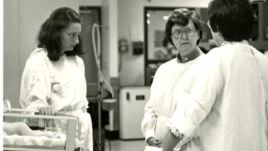This is the VOA Special English Health Report.
We told you last week about a study which found that more than ten percent of all babies worldwide are born too early. One common problem in preterm babies is respiratory disease. The lungs are the last organs to develop. But a medicine called surfactant can save babies struggling to breathe.
The story of this lifesaving medicine begins with a discovery in 1959 by a researcher named Mary Ellen Avery. She told this story in 2005 to Children's News at Children's Hospital Boston, where she was the first woman to serve as physician-in-chief.

She had been doing research at the Harvard School of Public Health. She was asked to find out more about the foam that forms in the lungs of people with a condition called pulmonary edema. At night she worked in a hospital delivery room. She saw many premature babies with hyaline membrane disease, now called respiratory distress syndrome.
She examined the lungs of babies who had died. She found there was no air in their lungs, and she discovered why. In her words, "The material that was important -- the foam -- was missing, and they were struggling to re-inflate their lungs. Nature put this foam, or surfactant, in the lung to lower surface tension. You cannot keep air spaces inflated without it."
Babies usually develop this coating while they are in the womb, but many premature babies do not.
Finally, in 1980, a Japanese pediatrician, Tetsuro Fujiwara, published a study about an artificial surfactant. It could be given to a baby and, within minutes, the baby could breathe.
The medical community had taken years to accept Dr. Avery's discovery. But she said in a Harvard Medical School interview in 1982 that she never gave up.
MARY ELLEN AVERY: "Hanging in there is key, I think. Knowing what you want to do and not being easily discouraged is key, particularly in research. You know, you're always moving into the unknown. And you can spend months trying to prove something, only to find that you made some terrible mistakes and you have to be willing to say 'six months of my life and my hard work went down the drain,' and you have to start over -- that's terrible discouragement."
Dr. Anne Hansen in the Neonatal Intensive Care Unit at Children's Hospital Boston remembers the first time she heard about Dr. Avery. It was in 1990, when the government was in the process of approving an early surfactant called Exosurf.
ANNE HANSEN: "And the attending [doctor] who I was on with said, 'When you're on call tonight, if there's a baby who's born who's premature, you should watch very closely the natural history of that disease, because this is the last night before we're going to start giving Exosurf to all our preterm babies, so this will be your last chance ever in your life to see what a preterm baby does when they don't receive Exosurf.' And then he told me the whole story of Dr. Avery and her discoveries."
Mary Ellen Avery was 84 years old when she died last December 4th.
And that's the VOA Special English Health Report. I'm Jim Tedder.
pulmonary edema: 肺水肿
Report calls attention to millions of preterm births
Premature babies have higher death rates in young adulthood
Study finds no reason to delay pregnancy after a miscarriage
Simple, low-cost ways to cut the risk of an early birth
(来源:VOA 编辑:旭燕)
